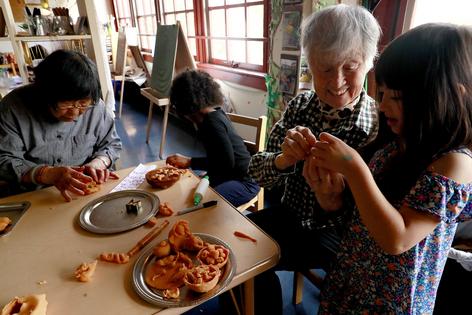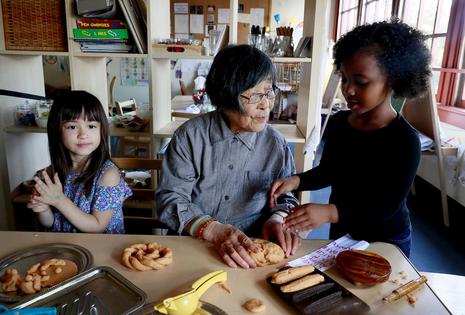At Pike Place Market, seniors and kids work well together … and schools and day cares nationwide are noticing
Published in Senior Living Features
SEATTLE - Several floors below the daily bustle of Seattle's famed public market, an octogenarian and a 5-year-old prepared a meal.
In a classroom filled with art projects and books, they shaped dumplings and decorated cookies - all out of orange Play-Doh. Most interactions between the two at the Pike Market Child Care and Preschool happen through gestures and touch, as 83-year-old Zhibin Ding's first language is Mandarin; preschooler Olivia's is English.
Ding twisted two pieces of dough into a braid and handed it to Olivia, who happily plated it alongside more make-believe food.
"Thank you," the beaming 5-year-old said.
They're not related, but Olivia - and the rest of the class - call her Grandma Ding.
The daycare center, which caters to families who live and work in the Pike Place Market community, regularly invites older adults to interact with the children. The intergenerational bonding is part of the state's Foster Grandparent program, which pairs low-income adults over 55 with children who need one-on-one support. The senior volunteers help with anything the kids may need - reading, communication issues, social anxieties or language barriers - and receive a small monthly stipend to help pay for transportation and training.
The idea is that different generations can learn from each other and provide one another with companionship. Older adults often love the structure and sense of community, but can also help children practice focusing, being patient and accepting people who don't look like them or speak the same language, said Kathleen Richardson, the executive director of Pike Place's day care.
In recent years, interest in intergenerational programs has skyrocketed, according to reports from Generations United, a Washington, D.C.-based organization that advocates for bringing people outside of each other's age groups together.
Generations United hosted its 20th annual conference in Portland, Org., last month, and it was the first time tickets ever sold out, said organization spokeswoman Sheri Steinig. And Foster Grandparents has chapters nationwide.
"I see it as almost like a movement," said Matthew Kaplan, a Pennsylvania State University professor who has studied intergenerational programs for more than 20 years. "There's growing recognition that for the health of individuals ... we really need to have strong intergenerational connections."
Because many researchers prefer to watch people's environments and relationships grow and change overtime, rather than conduct a controlled study, Kaplan said, there's little numerical data to prove the benefits.
"It's very messy," he said. "It's like recreating family."
So far, programs have spread mostly because of anecdotal evidence. Generations United has estimated there are at least 700 intergenerational programs throughout the country.
Supporters point to a recent spate of research showing that pairing children with people outside their age range, particularly older adults who can offer more life experience and a desire to give back, boosts their complex problem-solving skills and helps them grow into more community-minded and empathetic people.
The benefits, advocates say, go both ways: Seniors risk social isolation, which can lead to deteriorating health - including dementia and depression, according to a 2017 report from Oregon's Pacific University. Interacting with kids regularly in an educational environment lowers that risk, though the report noted more research is necessary.
Washington has seen similar boosts in intergenerational programming.
The state is home to at least nine organizations similar to the Foster Grandparent program, including the Intergenerational Learning Center at Providence Mount St. Vincent in West Seattle, Silver Kite Community Arts in Fremont, and the Bayview Retirement Community in Queen Anne.
"We have residents who have dementia or Alzheimer's disease," said Jackie Schooley, the director of the children's center at Bayview, which welcomes toddlers into the facility once a week. "When they hear a little voice or touch a little hand, they come out of themselves and are out in the real world more."
The Foster Grandparent program also partners with six other local schools and nonprofits in King and Snohomish counties, including Shoreline Community College's child learning facility, Washington Middle School and Thurgood Marshall Elementary School.
Most of them, like the year-round Pike Market Child Care and Preschool, involve interactive play, reading, music and dance.
At the Pike Place day care, the group also discusses identity, income inequality and "anti-bias education," Richardson said.
"The grandmas are part of that conversation," she said, adding that a translator often visits to help facilitate in-depth discussions. "We talk about race, families, skin color. Age is also one of the things that comes up."
Shuyao Shan, another one of the Pike Place "grandmas," has worked with the Foster Grandparent program for about seven years.
Shan recently returned to the program after taking a short break when her husband died last year, she said, tears filling her eyes. It's often lonely at home now, she said as she cleaned up the Play-Doh station.
"But with the kids, it's forgotten," she said. "They make me so happy."
Visit The Seattle Times at www.seattletimes.com










Comments